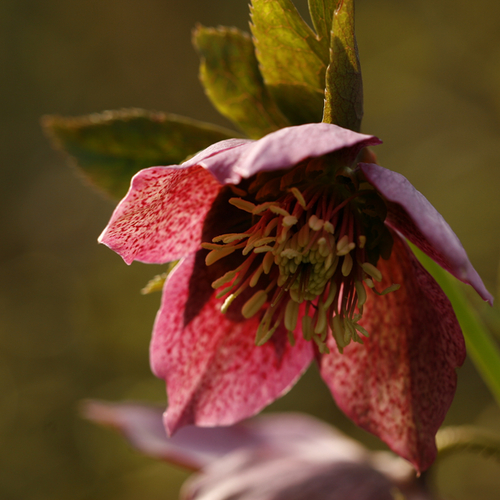
Background
People use black hellebore for conditions such as cancer, nausea, worms, irregular periods, and many others, but there is no scientific evidence to support these uses. Using black hellebore is also unsafe.
Safety Safety definitions
Special Precautions & Warnings:
While black hellebore is LIKELY UNSAFE for anyone to use, some people are especially sensitive to its harmful effects. Be particularly careful not to use black hellebore if you have one of the following conditions:Pregnancy and breast-feeding: It's LIKELY UNSAFE to use black hellebore if you are pregnant or breast-feeding. It might cause a dangerously irregular heartbeat. It might also cause a miscarriage.
Disorders of the stomach and intestines: It's UNSAFE to use black hellebore if you have a disorder affecting your digestive system.
Heart disease: It's UNSAFE to use black hellebore if you have a heart condition. It might make your heart condition worse.
Effectiveness
- Causing miscarriage in pregnancy.
- Colds.
- Constipation.
- Irregular menstrual periods.
- Kidney infections.
- Nausea.
- Worms.
- Other conditions.
Dosing & administration
Interactions with pharmaceuticals
Antibiotics (Macrolide antibiotics)
Interaction Rating=Moderate Be cautious with this combination.
Black hellebore can affect the heart. Some antibiotics might increase how much black hellebore the body absorbs. Taking black hellebore along with some antibiotics might increase the effects and side effects of black hellebore.
Some of these antibiotics, called macrolide antibiotics, include erythromycin, azithromycin, and clarithromycin.
Antibiotics (Tetracycline antibiotics)
Interaction Rating=Moderate Be cautious with this combination.
Taking antibiotics along with black hellebore might increase the chance of side effects from black hellebore.
Some antibiotics that interact with black hellebore include demeclocycline (Declomycin), minocycline (Minocin), and tetracycline (Achromycin).
Digoxin (Lanoxin)
Interaction Rating=Moderate Be cautious with this combination.
Digoxin (Lanoxin) helps the heart beat more strongly. Black hellebore also seems to affect the heart. Taking black hellebore along with digoxin can increase the effects and the risk of side effects of digoxin and black hellebore. Do not take black hellebore if you are taking digoxin (Lanoxin) without talking to your healthcare professional.
Quinine
Interaction Rating=Moderate Be cautious with this combination.
Black hellebore can affect the heart. Quinine can also affect the heart. Taking quinine along with black hellebore might cause serious heart problems.
Stimulant laxatives
Interaction Rating=Moderate Be cautious with this combination.
Black hellebore can affect the heart. The heart uses potassium. Laxatives called stimulant laxatives can decrease potassium levels in the body. Low potassium levels can increase the chance of side effects from black hellebore.
Some stimulant laxatives include bisacodyl (Correctol, Dulcolax), cascara, castor oil (Purge), senna (Senokot), and others.
Water pills (Diuretic drugs)
Interaction Rating=Moderate Be cautious with this combination.
Black hellebore might affect the heart. "Water pills" can decrease potassium in the body. Low potassium levels can also affect the heart and increase the risk of side effects from black hellebore.
Some "water pills" that can deplete potassium include chlorothiazide (Diuril), chlorthalidone (Thalitone), furosemide (Lasix), hydrochlorothiazide (HCTZ, HydroDiuril, Microzide), and others.
Interactions with herbs & supplements
Horsetail: Black hellebore contains chemicals called cardiac glycosides. Cardiac glycosides can cause the body to lose too much potassium, and this can harm the heart. Horsetail increases the production of urine (acts as a diuretic) and this can cause the body to lose potassium. There is a concern that using horsetail with cardiac glycoside-containing herbs such as black hellebore increases the risk of losing too much potassium and increases the risk of heart damage. Avoid using black hellebore with horsetail.
Licorice: Black hellebore contains chemicals called cardiac glycosides. Cardiac glycosides can cause the body to lose too much potassium, and this can harm the heart. Licorice also causes the body to lose potassium. There is a concern that using licorice with cardiac glycoside-containing herbs such as black hellebore increases the risk of losing too much potassium and increases the risk of heart damage. Avoid using black hellebore with licorice.
Stimulant laxative herbs: Stimulant laxative herbs speed up the bowels. As a result, food may not remain in the intestine long enough for the body to absorb minerals such as potassium. This can lead to lower than ideal potassium levels. Black hellebore can also cause the body to lose potassium due to the effects of the cardiac glycosides it contains. There is a concern that taking black hellebore along with stimulant laxatives herbs can make potassium levels drop too low, and this can harm the heart. Stimulant laxative herbs include aloe, alder buckthorn, black root, blue flag, butternut bark, colocynth, European buckthorn, fo-ti, gamboge, gossypol, greater bindweed, jalap, manna, Mexican scammony root, rhubarb, senna, and yellow dock. Avoid using black hellebore with any of these.




